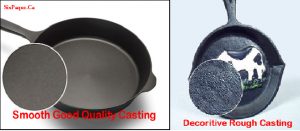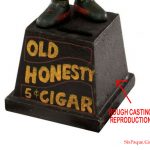
#47 of a Series of 50

Comparing Good and Bad Casting
BUT HOW DO YOU KNOW IF IT’s OLD?
In order to understand the difference between an older piece of cast iron and a newer piece (reproduction), you have to somewhat understand what cast iron is and how it’s made. Especially cast iron Collectables and antiques.
∞ Very general rules
In the olden, golden days talented wood craftsmen would have carved out the perfect shape of a item with fine detailing and then heated up molted metal to around 2000 decrease (give or take) and pour it into the mold. When cooled the two or more parts of the mold are separated and wa-la, the shape of whatever you designed is made. Most wood molds are generally only used once due to the heat.
Cast or casting is generally referring to a mold. People that do ceramics in most part use molds and they blow hot glass into it to get it’s shape and what it’s going to look like is determined by the shape of the mold.
∞ Cast iron is the same
Now having said that, cost effective reusable molds would be made of sand and water Solutions, which are referred to as “SAND MOLDS” They’re more widely used especially on smaller items, such as toys, banks etc.
THE FINER THE SAND THE FINER, SMOOTHER AND DETAILED THE ITEM WILL BE. THE COARSER THE SAND,AND ROUGHER TO THE TOUCH, THE DETAIL AND QUALITY WOULD BE GONE, “you get the idea”.
I never understood this part of today’s technology. By far our way of casting exceeds the casting from 50 or 200 years back. But the cast iron parts made today are coarser to the touch, crudely made, and in most part, in my thinking, not really attractive looking. In other words, they’re cheaply machine made, especially on reproduction antique and collectable Parts.
Cast Iron Collectables
So if we’re talking old cast iron money banks, cast iron door stops, door hammers, even cast iron toys, frying pans anything that has been molded, check the surface for fine or rough texture.
When I’m referring to casting, once you make that mold, you could theoretically pour molted aluminum instead of iron. That would make it cast aluminum. Many everyday items are cast aluminum.
If you look at any bottle, (pop bottle to beer bottle) look at the side from the bottom to the top, see and feel the 2 lines, one on each side of the bottle. That’s from where the two half’s of the mold met and separated to make the bottle.
That’s one way of telling how old the bottle is, but that’s a different subject all together.
There are many things that are made from molds. Fiberglass boats and cars parts, to name a few, are made from molds. So that technology is widely used today.
BUT WE ARE TALKING ABOUT CAST IRON. Eh!
By the way, iron is a very cheap “metal” by-product of steel.
∞ Seven fast ways I check the age of cast iron.
- Check the smoothness of the piece.

REPRODUCTION ROUGH CAST IRON
- Check how parts fit together, tight with very little to no gaps, that’s a good thing. Remember craftsmanship, real people assembled these pieces not machines.
- Check inside of the part. Sometimes the casting is reasonably smooth on the outside but very coarse on the inside. That would be a red flag.
- Check the quality of paint. In most cases, depending on the manufacturer, they dip the items in paint, which makes the paint thicker. Today items are sprayed on with very low quality paint and thickness.
- 100 year old paint would in most part still look like last week’s paint job.
- Check the screw or screws holding the sections/parts together. Older items before and around the industrial evolution were slotted screw heads, and, don’t get me wrong

WHAT A SLOTTED SCREW LOOKS LIKE IN AN ANTIQUE
(that’s not saying the screw was not changed), but it does devalue the piece no less and could just throw you off from thinking it’s not an original.
- They say compare the size of the part to a known authentic WHAT EVER. The reproduction one would be a different size than the original. There are some reference books that will give you measurements and that’s only if you’re really concerned or paying large dollars for the item.
Once you get used to a few simple tricks, you might have a better understanding what to look for. There are more good reproductions of cast iron parts out there than the old authentic ones. But you will at least be armed with a few general things to look for.
Please check out my blog on “Cast Iron Trivets” (LINK)
Note.
By the way, small cast iron items such as banks, toy figurine, kitchen ware, skillets, anything small are good sellers, or on the other hand, just good collector items. Just remember, collecting cast iron “anything”, doesn’t take up a lot of room.
Please check out my post on Collecting Space Age Toys.
This is part of of a series of 50
“THE LEAST YOU SHOULD KNOW” 50 series.
Please Donate
If you find my Blog Posts entertaining and maybe
Useful, maybe even a little Patriotic at times.
Please consider donating to a starving Canadian blogger.
Pay through Secured PayPal
Thank you in advance.
,,,,,,,,,,,,,,,,,,,,,,,,,,,,,,,,,,,,,,,,,,,,,,,,,,,,,,,,,,,,,,,,,,,,,
